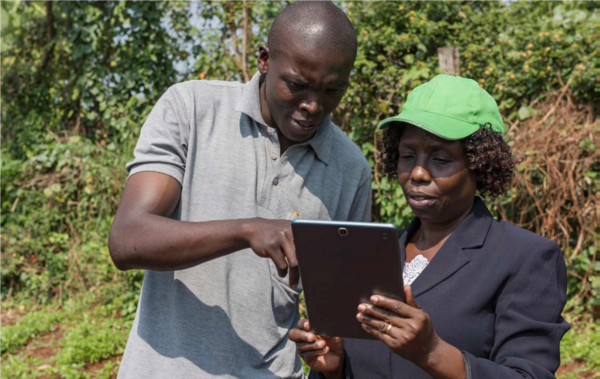- Share this article
- Subscribe to our newsletter
GIZ seeks local solutions to the coronavirus pandemic
Deutsche Gesellschaft für Internationale Zusammenarbeit (GIZ) GmbH has been commissioned by the German Federal Government to support world-wide efforts to combat the coronavirus pandemic. A wide range of approaches are being applied. In addition to extensive support measures in the health sector, GIZ staff are developing new ideas on how farmers can safely cultivate their fields in times of the corona pandemic. The focus here is on African countries south of the Sahara. Some examples are given below.
An app as an advisor on crop farming in Kenya
Given the country-wide lockdown, the Green Innovation Centre in western Kenya has resorted to the smartphone. The “KALRO GAPs App” has been available as a pilot version since late March, and it provides far-reaching recommendations on 14 different crop cultures for daily demand, including maize, sweet potatoes or bananas.
Commissioned by the German Federal Ministry for Economic Cooperation and Development (BMZ), GIZ is working on advancing the app. Farmers throughout the country receive information on items such as selecting and preparing suitable cropland, irrigation, using fertiliser or post-harvest practices.
There is a special focus on reducing harm to nature and on climate-friendly practices. In future, the app is to provide advice on plant protection, processing and marketing as well.
Safe cultivation in the fields – the example of Ethiopia
Wherever direct contact with the farmers is no longer possible, two projects in Ethiopia are applying unusual methods.
A new radio programme is informing half a million farmers how to protect themselves against the coronavirus especially during the cultivating season, which started in June. Advice on cultivation itself, which would normally be provided directly in the fields, is now given via the radio too. The programme has so far been broadcast in the Amhara region, together with a local media agency. It is planned to extend these radio-based advisory projects to the regions of Oromia and Tigray as well.
In addition, over the last few weeks, the Green Innovation Centre in Ethiopia has produced 30,000 posters and 3,000 flyers that have been distributed in the country’s rural regions and are meant to inform the rural population on precautionary measures to prevent COVID-19.
Both projects in Ethiopia are part of the BMZ’s “ONEWORLD no Hunger” special initiative.
What healthcare in Malawi lacks most
In Malawi, around 5.5 million people are benefiting from the German Federal Government’s emergency relief measures. “We are flexible and respond to the needs of the country’s districts,” says Kai Straehler-Pohl, Project Director of the Malawi-German Health Programme. “While we are continuing our ongoing work, we are also adapting our activities to the new challenges.”
For example, one new focus of the Health Programme in Malawi is to prepare hospitals to treat COVID-19 patients, providing three million people with access to better healthcare. The district hospital health staff are also being trained in properly treating sick people and interrupting infection chains.
Furthermore, together with the Malawi Red Cross and local non-governmental organisations, medical and care staff are being trained to spot suspect COVID-19 cases and how to treat suspect cases, how the contacts of infected individuals can be traced back and how catching the disease can be avoided. In addition, the GIZ team are advising district governments and local influential persons such as parsons, village chiefs and heads of cooperatives on how dangerous the virus is and how people can protect themselves.
Treating highly contagious diseases more effectively – the example of Liberia
Already in 2016, in the context of the Ebola outbreak, the German Federal Government commissioned GIZ to support the Government of Liberia in developing a resilient health system. In particular, GIZ provided advice to two hospitals, from which now, during the COVID-19 pandemic, more than 700,000 people are benefiting.
In the context of the coronavirus pandemic, GIZ is above all supporting the National Public Health Institute of Liberia (NPHIL), the Health Ministry and regional health teams in swiftly diagnosing and treating cases of the COVID-19 lung disease and tracing back contacts in time.
“The aim of the project in 2016 was to better prepare Liberia for highly infectious diseases,” explains GIZ Project Director Damien Bishop. “That is why we have now been able to take action so swiftly. We were at the right place with the right expert knowhow at the right time.”
Like in Malawi and other African countries, the GIZ project has above all trained health staff in treating highly infectious diseases and preventing themselves or other patients from catching them. In addition, GIZ informs the population about the risks of becoming infected and how important it is to consult a physician as quickly as possible.
(giz/wi)
See also information about COVID-19 on the GIZ-Website





Add a comment
Be the First to Comment